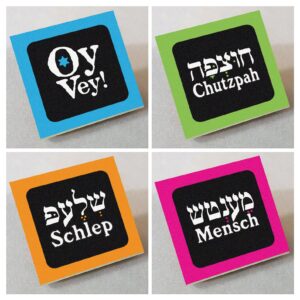
Shop: WordPlayGifts
Photo: Courtesy of Etsy
Growing up in Europe, I was always surrounded by European Jewish culture. While I was still at university, I once found myself standing in the linguistics department’s library waiting for a friend to finish one of their classes. Browsing through some of the oldest books our alma mater had to offer, I quickly stumbled across a book written in Yiddish. It was a rather unexpected, yet very pleasant, surprise. I couldn’t help but smile. Back then, my university was only in the process of creating a Jewish studies program. Who would have thought that the very same day it was announced, I would hold a collection of Yiddish poetry in my hands?
Hearing, or reading, Yiddish words has always warmed my heart. There is something comforting and deeply familiar about the Yiddish language. As a fluent German and Hebrew speaker, it is not very hard for me to read through a Yiddish book in no time even if I don’t speak the language on a daily basis.
Feeling such a deep connection to the Yiddish language, I would be devastated if it would die out entirely or to only be analysed in academia by University students who are looking to find similarities with other languages and/or their decay.
Being one of the few members of our team having a fully Ashkenazi Jewish background, I want to share my ten favourite Yiddish words and expressions with you:
- Chutzpah – Chutzpah comes from the Hebrew word “חֻצְפָּה” and means “audacity”.
- Gornisht– Gornisht comes from the German expression “gar nichts”, which means “nothing at all”.
- Mensch– Mensch is the German word for “human being”.
- Mishpoche – Mishpoche comes from the Hebrew word “מִשׁפָּחָה”, which means family.
- Nosh – Nosh comes from the German verb “naschen” and means “to nibble”.
- Nu – Nu comes from the German word “nun” and means “So?”.
- Shlissel – Shlisses from the German word “Schlüssel”, which means key.
- Spiel– Spiel is the German word for game.
- Zeeskeit – Zeeskeit come from the German word “Süßigkeit”, which means “sweet” (as in to eat a sweet) as well as “sweetness”. Zeeskeit ist a common word of endearment being used in the Yiddish language.
- Zei Gezunt – Zei Gezunt comes from the German expression “Sei gesund”, which means “be healthy.”
Not enough time to study Yiddish? No worries.
There is always a way to invite some Yiddish flair into your home …


Shop: TolonensisCreation
Photos: Courtesy of ETSY






